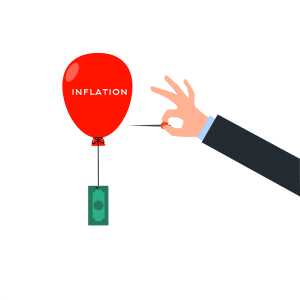What is Inflation and How it Works?
Inflation Meaning
Inflation is a term that we often hear in the news, in economic reports, and even in normal everyday conversations. Most of us understand inflation as something that makes the cost of living more expensive. But have you ever wondered – what is inflation? How does it work? And why is it so important?
In this article, we will delve into the basics of inflation, its different types, and how it can affect us in our daily lives. Whether you’re a middle-class or poor-class individual, understanding inflation can help you make better financial decisions and protect your future savings.
What is inflation?
Inflation is a sustained and general increase in the prices of goods and services in an economy over a period of time. In other words, inflation means that the purchasing power of a currency decreases over time. When prices go up, the value of money goes down. Inflation is measured through the inflation rate, which indicates the percentage increase in the average price level of goods and services over a specific period.
Types of inflation
There are different types of inflation depending on their causes and effects on an economy. The most common types of inflation are:
1. Demand-pull inflation – This type of inflation occurs when there is an excess demand for goods and services, leading to an increase in prices. In a demand-pull inflation scenario, consumers have more money to spend than the available goods and services offered in the market, leading to higher prices.
2. Cost-push inflation – This type of inflation occurs when there is a significant increase in the cost of production, leading to higher prices. This can be caused by factors such as increased wages, higher raw material prices, or taxes. Higher costs of production lead to higher prices for final products, which consumers have to pay.
3. Built-in inflation – This type of inflation occurs when people expect inflation and anticipate that prices will rise, leading to an increase in demand for wages. Wage increases lead to higher production costs, which are then passed down to consumers in the form of higher prices.
How Does Inflation Work
Inflation can have both positive and negative effects on an economy and its citizens. Some of the positive effects include:
1. Encouraging spending – When inflation occurs, people may start spending more in anticipation of prices rising in the future. This increased spending can stimulate the economy and create job opportunities.
2. Encouraging investment – Inflation can also encourage people to invest their money in stocks, real estate, or other assets that have a better chance of yielding higher returns than just holding onto cash.
However, inflation can also have negative effects, such as:
1. Reducing purchasing power – As the prices of goods and services go up, the purchasing power of money decreases. People may have to spend more money to purchase the same goods and services they used to buy for less.
2. Reducing savings – Inflation can also reduce the value of savings over time. For example, if a person has savings worth $10,000 and the inflation rate is 2%, the real value of those savings after a year will be $9,800.
Conclusion
Understanding what inflation is, its different types, and its effects can help individuals make better financial decisions. Inflation can be both beneficial and problematic, depending on the context and perspective. With this knowledge, individuals can plan and adjust their spending, saving, and investment strategies to protect their financial wellness and achieve their long-term financial goals.


